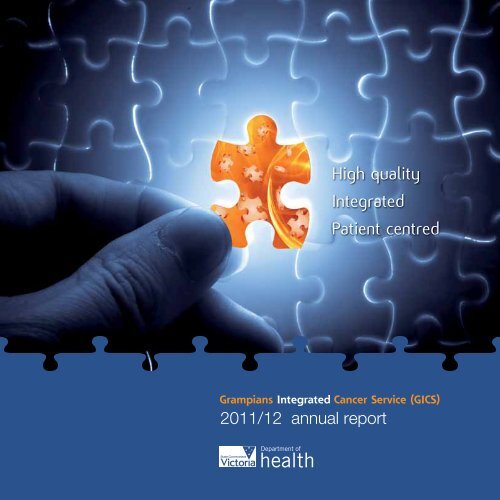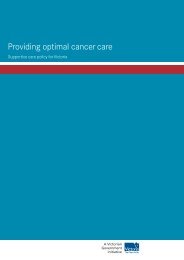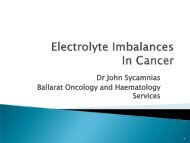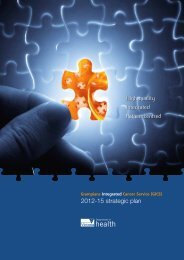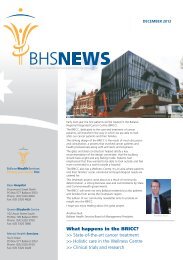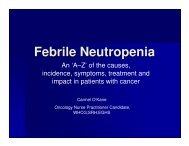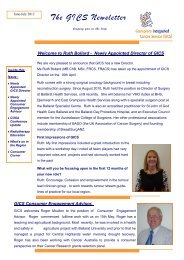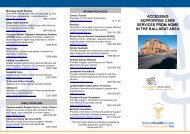GICS 2011/12 annual report - Grampians Integrated Cancer Service
GICS 2011/12 annual report - Grampians Integrated Cancer Service
GICS 2011/12 annual report - Grampians Integrated Cancer Service
You also want an ePaper? Increase the reach of your titles
YUMPU automatically turns print PDFs into web optimized ePapers that Google loves.
Improve effectiveness of careWhile we continue to work with our regional healthpartners, health professionals and government, wenever lose sight of the fact that we are working withpatients and survivors of cancer, their families, friends,carers, volunteers, advocates and support groups toimprove the patients’ cancer journey. That is our drivingforce: our strategic planning, The Lead Clinicians TumourGroup (LCTG), Multidisciplinary Meetings (MDMs), clinicalguideline development, volunteer training, education – allhave one aim in common; to improve cancer care for the<strong>Grampians</strong> Region.Build the consumer role<strong>GICS</strong> has increased the membership of and revised theTerms of Reference for its Consumer Advisory Group(CAG) which meets regularly to guide <strong>GICS</strong>’ businessin all areas, with particular emphasis on advancing therecommendations of the Consumer research <strong>report</strong>published by <strong>GICS</strong> in <strong>2011</strong>: You Don’t Get Called a Patientfor Nothing.The development of the Ballarat Regional <strong>Integrated</strong><strong>Cancer</strong> Centre (BRICC) has given <strong>GICS</strong> much cause forreflection as we work with our partners in the establishmentof the BRICC Wellness Centre. <strong>GICS</strong> ConsumerEngagement Advisor is actively involved in the projectmanagement of the BRICC Wellness model.There is an understanding that quality improvementreinforces every action taken by those involved with<strong>GICS</strong>. It is an imperative that we continue to strive forbest practice in our work to gain positive outcomes forconsumers. Staff are to be commended for the ways inwhich they approach their projects, objectively reviewingand considering their work from a consumer perspective.Create and implement clinical indicatorsof cancer service qualityDuring the year the Director has met with Lead Cliniciansto scope the development of guidelines for each tumourstream. Their input has been most encouraging and weare very grateful for their commitment to the project.Throughout the <strong>report</strong> we have taken quotes from “YouDon’t Get Called a Patient for Nothing” as the consumers’stories reflect <strong>GICS</strong>’ aims.ChairAssociate Professor Philip ReasbeckExecutive Director of Medical <strong>Service</strong>sBallarat Health <strong>Service</strong>sDirectorMs Ruth Bollard, <strong>GICS</strong>Strategic ManagerBridget Wislang, <strong>GICS</strong><strong>2011</strong>/<strong>12</strong> <strong>annual</strong> <strong>report</strong>| 5
<strong>GICS</strong>’ partnersVery few journeys are taken in isolation and <strong>GICS</strong> would like to acknowledge its partners in the delivery ofperson-centred cancer care in the <strong>Grampians</strong> Region.Ballan District Health & CareBallarat Austin RadiationOncology CentreBallarat Community HealthBallarat District Nursing & HealthcareBallarat Health <strong>Service</strong>sBallarat Hospice Care IncBallarat Oncology andHaematology <strong>Service</strong>sBeaufort and Skipton Health <strong>Service</strong>Central Highlands PrimaryCare PartnershipDjerriwarrh Health <strong>Service</strong>sDorevitch PathologyDunmunkle Health <strong>Service</strong>sEast <strong>Grampians</strong> Health <strong>Service</strong>East Wimmera Health <strong>Service</strong>Edenhope District Memorial Hospital<strong>Grampians</strong> and Pyrenees PrimaryCare Partnership<strong>Grampians</strong> Community Health<strong>Grampians</strong> Medicare Local<strong>Grampians</strong> Palliative Care ConsortiumHepburn Health <strong>Service</strong>Lake ImagingMaryborough and DistrictHealth <strong>Service</strong>Rural Northwest HealthRural Palliative Care ProjectSt John of God HealthcareStawell Regional HealthUniversity of BallaratWestVic Division of General Practice(now <strong>Grampians</strong> Medicare Local)West Wimmera Health <strong>Service</strong>Wimmera Health Care GroupWimmera Primary Care PartnershipWimmera VolunteersWomen’s Health <strong>Grampians</strong>“Rachael came into contact with a number of formal services that were intrinsicin facilitating her move from feeling helpless and alone, to feeling supported. Theyprovided Rachel with information, equipment and assistance in caring for herhusband. This was the start of Rachael feeling supported emotionally through herjourney, a connection that lasts to this day”6 |<strong>2011</strong>/<strong>12</strong> <strong>annual</strong> <strong>report</strong>
highlights throughout the yearStrengthen governance mechanisms<strong>GICS</strong>’ Strategic Plan 20<strong>12</strong>-2015 has been developed withsignificant stakeholder input and consensus on how toimprove cancer services across the <strong>Grampians</strong> Region.Key messages include:• Strengthening governance mechanisms by linking moreeffectively with key cancer services and clinical driversacross the <strong>Grampians</strong> Region;• Developing a regional framework for cancer educationfor Nurses and General Practitioners;• Develop the capacity for consumers to participate at alllevels in regional cancer service development;• Work towards improving information sharing betweenpublic, private, regional and rural oncology services;• Establish shared models of funding and service provisionto offer additional supportive care where needed most;• Work with lead clinicians to create clinical indicators tohighlight the quality of cancer treatments between all keystakeholders.Promote implementation of best practicemodels of care<strong>GICS</strong> has undertaken a Regional <strong>Cancer</strong> Nurse EducatorProject. The Training and Development Division of theDepartment of Health has confirmed that it will fund aregional Oncology Nurse Educator position. Along withpromotion and provision of cancer nurse education andtraining, the position will support <strong>Grampians</strong> MedicareLocal to identify GP training needs. Implementation isexpected in early 2013.The initial stage was the development of a regional <strong>Cancer</strong>Education Framework, the aim of which is to streamlinecancer nurse education and improve access to evidencebased, online education to reduce unwanted variation incancer treatment and care.Improve effectiveness of careAn electronic mechanism for information sharing betweenprivate provider Ballarat Oncology and Haematology<strong>Service</strong> (BOHS) and Ballarat Health <strong>Service</strong>s’ (BHS)Emergency Department has been successfullyimplemented with BHS now receiving messages andattachments from BOHS on patient diagnosis andtreatment details, when cancer patients of the BOHSpresent to the BHS Emergency Department.“I have linked in with hospice and they have been wonderful. The ovariancancer service says you should do that before you really need it and the samewith palliative care” Penny’s story<strong>2011</strong>/<strong>12</strong> <strong>annual</strong> <strong>report</strong>| 9
highlights throughout the year<strong>GICS</strong> has created and largely implemented an MDMManagement database that promotes timely and accuratesubmission of patient information by clinicians, includingstaging of tumours and clinical records within the MDMprocess. The electronic patient referral mechanism hasbeen scoped and will be implemented by the end of thecalendar year. Real time recording of treatment planstowards wide screen projection during meetings has beenpiloted at several MDMs and fields have been designed inthe database to capture these results.<strong>GICS</strong> is also working with BHS Radiology and IT toimplement an image sharing function that already existsbetween <strong>GICS</strong> and Lake Imaging. This will enable secureimages to be shared at MDMs to accelerate tasks.Build the consumer roleThe release of You Don’t Get Called a Patient forNothing, a publication of case studies based on theresearch project undertaken in <strong>2011</strong> by Professor AnthonyLove and Researcher Laura Liversage, with the assistanceof Michael Coleman and Fiona Watson. This booklethas been extremely well received by health professionalsand consumers throughout the <strong>Grampians</strong> Region andwider Victoria as it provides real stories in the consumers’own words.“The case studies are an important part ofwork with consumers and carers across the<strong>Grampians</strong> Region” Helen Wade, ChairBased upon results from You Don’t Get Called a Patientfor Nothing, the <strong>GICS</strong> Consumer Advisory Group (CAG)approved an information package developed by <strong>GICS</strong> fornewly diagnosed patients to be provided to cancer servicesthroughout the region. Whilst recognising that there isa plethora of information available to cancer patientsfrom different sources, and that it is often overwhelmingfor them, the purpose of the package is to providebasic supportive care information and contacts to newlydiagnosed patients and their carers, with the messagethat this ought only be read and considered when peoplefeel the time is right for them. This reflects the importanceof health practitioners to support the rights of newlydiagnosed patients’ access to quality information, yetwithin the patients’ own terms of comfort and readiness.Since first distribution in July 20<strong>12</strong>, demand for thepackages from health services has increased.Also as a result of <strong>GICS</strong>’ consumer research, and alignedwith the BRICC Wellness Centre project, <strong>GICS</strong> has beeninvestigating the transport requirements of rural <strong>Grampians</strong>patients. At the time of writing <strong>GICS</strong> is undertaking astocktake and gap analysis of transport services for ruralpatients, with a view to improving coordination of andaccess to existing transport services.“I think information should be at yourfirst port of call which is usually thedoctor’s office. If some of that informationwas available right from the start it wouldgive the opportunity to make decisionsmuch earlier” Mark’s story10 |<strong>2011</strong>/<strong>12</strong> <strong>annual</strong> <strong>report</strong>
Three <strong>GICS</strong> employees and the Chair of <strong>GICS</strong>’ CAGhave completed certificate and graduate level courses inconsumer leadership and engagement through the HealthIssues Centre of La Trobe University this year. <strong>GICS</strong> alsosupported a successful submission for funding to <strong>Cancer</strong>Australia by <strong>Cancer</strong> Voices Victoria to provide regionaloutreach training in consumer leadership and advocacy.Create and implement clinical indicators of cancerservice qualityIn collaboration with the Lead Clinicians Tumour Group,<strong>GICS</strong>’ Director Ms Ruth Bollard is developing ClinicalGuidelines for each tumour stream.The LCTG has agreed that the Guidelines will include:• Diagnostic guidance on tests and for staging• Submission of patients to MDMs• Radiation oncology referral• Surgical guidelines• General practice investigation and referral• Follow up• Supportive care• Referral for palliationIt is <strong>GICS</strong>’ vision that the Guidelines will form the basis forthe development of future clinical indicators to benchmarkregional performance.While not prescriptive, the guidelines will refer to tools thatprovide guidance on current best practice for diagnosis,treatment, support, management through survivorship andend of life care.Lea Marshall, Robyn McIntyre and Bridget Wislang at the <strong>Cancer</strong> CareCoordinators Conference in Melbourne March 20<strong>12</strong><strong>2011</strong>/<strong>12</strong> <strong>annual</strong> <strong>report</strong>| 11
consumer engagementFollowing the resignation of Michael Coleman we werepleased to appoint Roger Moulton to the position ofConsumer Engagement Advisor. Roger brings to the rolea background in sustainable agriculture, small businessmanagement and secondary school teaching. Hisadditional experience as a consumer and carer, togetherwith <strong>GICS</strong> Consumer Advisory Group members’ input hasstrengthened <strong>GICS</strong>’ focus on consumer interests in all ofour activities.Strengthen governance mechanismsRoger is a member of the leadership group for the BRICCWellness model. He, along with other members, is involvedin the Wellness model planning and implementation andvolunteer recruitment, an important aspect of the dailyfunctioning of BRICC. The introduction of volunteers whohave undertaken training to perform specialist tasks thatcomplement the work of paid staff will enhance the overallWellness Centre environment. <strong>GICS</strong> is currently studyingvolunteer recruitment models already successfully workingat BAROC, BHS and other health services.Build the consumer roleSince taking up the position, Roger’s priority has been toengage broadly with health service stakeholders includingBallarat Health <strong>Service</strong> consumer liaison, <strong>Grampians</strong>Medicare Local, McGrath nurses, East <strong>Grampians</strong> Health<strong>Service</strong>, Stawell Regional Health, consumers and supportgroups to promote the value of consumer input. Their inputis invaluable to <strong>GICS</strong>’ project planning.<strong>GICS</strong>’ Consumer Advisory Group (CAG) has reviewed itsTerms of Reference to reflect that this group understandsthe importance of continuing to meet communityexpectations. Roger aims to increase the number oftrained advocates for cancer service improvement in the<strong>Grampians</strong> Region.multidisciplinary meetingsMultidisciplinary meetings (MDMs) are an essentialcomponent to sharing and understanding diagnoses andplanning treatment for patients within the<strong>Grampians</strong> Region.Strengthen governance mechanismsIn line with other <strong>GICS</strong>’ programs, the Lead ClinicianTumour Group Terms of Reference have been reviewedagainst the 20<strong>12</strong>-15 Strategic Plan to ensure they continueto reflect the agreed aims and desired outcomes.Promote implementation of best practicemodels of careIt was most gratifying for <strong>GICS</strong> to see Carole JonesMultidisciplinary Coordinator recognised as Employee ofthe Month by Ballarat Health <strong>Service</strong>s for her continuedefforts to improve MDM meetings and processes.Carole Jones receiving her Employee of the Month award from PresidentAndrew Faull<strong>12</strong> |<strong>2011</strong>/<strong>12</strong> <strong>annual</strong> <strong>report</strong>
Improve effectiveness of careThe implementation of a custom designed multidisciplinarymeeting database (called BPMOne) by <strong>GICS</strong> has been amajor undertaking for the MDM team at <strong>GICS</strong> this year.Development of the database is 90% completed withremaining development tasks and full implementation ontrack to be completed in early 2013. A number of manualtasks in meeting arrangements are now automated andas implementation continues these are expected to furtherstreamline the <strong>GICS</strong> hosted MDM processes and provideproductivity gains for the <strong>GICS</strong> team.“Everybody in that room has got theirown little battle going on and everybody isdoing the same thing and you are doing itin your style and all of a sudden that eventis finished..there is a loss” Sue’s storyThe system components are: 1) a process managementtool to organise meetings, request and prepare diagnosticmaterial, support emails for arrangements, and postmeetingdistribution of treatment plans; 2) a live recordof meeting proceedings, and <strong>report</strong> decisions made totreating practitioners; and 3) an extensive collection ofclinical details as per the consensus dataset for MDMs,use of VAED/ICD-10 codes to enable data collection,support multiple diagnosis, procedures, staging, SSF(individual tumour behaviour) and treatment codes foreach patient discussed.Improvements have also been made to streamline imagesharing with all MDM participants. BHS Radiology and ITnow mimic the service that already occurs between <strong>GICS</strong>and Lake Imaging. This has enabled secure images tobe shared amongst all MDM members, providing a moreefficient use of time and expertise.With Pathologists and Radiologists fundamental to theMDMs, participation by outlying pathology services hasbeen enhanced to extend MDMs’ area of influence.Radiology input has also been expanded to recognisethe importance of processes that are more inclusive andfar-reaching.In regional and rural communities the use of technologyhas proved to be vital in disseminating information andimproving communication. As well as sharing the benefitsof WebEx with other ICS, Wimmera MDMs have maximisedthe use of WebEx and assisted Mildura for Loddon MalleeICS to set up its own webconference meetings. TheWimmera MDM has also introduced integrated stagingand capture of clinical trials, from discussion through totreatment plans.A survey of the effectiveness of <strong>GICS</strong> hosted MDMs, fromthe perspective of clinicians and all attendees has recentlybeen conducted by <strong>GICS</strong> to identify which areas <strong>GICS</strong> canwork with clinicians to strengthen the processes of MDMsacross all tumour streams. Results are currently beingcollated and we are particularly grateful for the guidanceand oversight of Dr Sharon Wallace, St John of GodPathologist and <strong>GICS</strong>’ Governance committee member forher oversight of the survey’s development.<strong>2011</strong>/<strong>12</strong> <strong>annual</strong> <strong>report</strong>| 13
multidisciplinary meetings14 |<strong>2011</strong>/<strong>12</strong> <strong>annual</strong> <strong>report</strong>
supportive careIn a person’s cancer journey Supportive Care is whatguides the patient and family through numerous meetingsand appointments, from initial diagnosis through totreatment and beyond. Each member of the SupportiveCare team is also guided by patients, who come with theirown expectations and anxieties.Promote implementation of best practicemodels of careSupportive Care Screening continued to be trialled andimplemented at Ballarat Health <strong>Service</strong>, East <strong>Grampians</strong>Health <strong>Service</strong>, Stawell Regional Health and WimmeraHealth Care Group during the year. The outcome confirmedthat screening as part of routine clinical practice increasedawareness of the impact and prevalence of distress.Screening using the validated Distress Thermometer toolis now routine at Ballarat Austin Radiation and Oncology<strong>Service</strong> (BAROC), with 100% of cancer patients nowoffered routine screening.A regional user group has been established by <strong>GICS</strong> tosupport shared learning and implementation processes forSupportive Care screening. Members from health servicesmeet regularly to progress towards full implementation ofsupportive care screening within the region.Whilst Supportive Care screening is something thatcancer nurses and specialists have always done, theformalisation of it using a validated screening tool and,along with documentation of results, is new to many.<strong>GICS</strong> is grateful for the dedication of Kerry Davidson,Supportive Care Project Officer at Ballarat Health <strong>Service</strong>s,Angie Spencer, DON Medical and Critical Care <strong>Service</strong>,Ballarat Health <strong>Service</strong>s and Carmel O’Kane, OncologyNurse Practitioner, Wimmera Health Care Group for theirconsistent dedication to the promotion of supportive carescreening for cancer patients.In addition <strong>GICS</strong> is grateful for the assiduous guidance andproject oversight of Robyn McIntyre, <strong>GICS</strong> <strong>Cancer</strong> <strong>Service</strong>Improvement Coordinator, on this project. Through Robyn,<strong>GICS</strong> has taken an innovative approach to educatingnurses on supportive care screening by using professionalactors to role play various scenarios with them.Furthermore, through Robyn’s project leadership, a newdatabase is being piloted by <strong>GICS</strong> to capture regionaldata on Supportive Care screening and results areexpected to highlight the greatest areas of service needfrom a patient perspective.Melanie felt that her needs as a carer wereto make sure she was well to continuelooking after Sue. Although she felt thatshe didn’t need extra support at this time,she advised other carers to seek out supportif needed.Carmel O’Kane, Oncology Nurse Practitioner, <strong>Grampians</strong> Region.<strong>2011</strong>/<strong>12</strong> <strong>annual</strong> <strong>report</strong>| 15
supportive careScreening completed by tumour typeA Snapshot from the Eleventh Month of Screeningat Ballarat Health <strong>Service</strong>sOctober 20<strong>12</strong>• A total of 24 patients were screened, 16 in theDay Oncology setting and 8 in the Surgical OutpatientBreast Clinic.• 58% of patients did not require referral on for furthersupports / intervention.• 37.5% of patients resided outside the City ofBallarat area“We don’t exactly know how everybody isfeeling but we have a great understandingbecause we have travelled a similarjourney, a very similar journey”Mary’s storyReferrals were made as follows:Breast Care Nurse 33.3% (n=8)Social Work8.3% (n=2)Dietetics8.3% (n=2)Psychology8.3% (n=2)Hospice8.3% (n=2)Single referrals were made to Physiotherapy, DiabetesEducator and HARP.The top 10 problems <strong>report</strong>ed by patients wereas follows:Sleep 54% of patients (n=13)Worry 54% of patients (n=13)Nervousness 50% of patients (n=<strong>12</strong>)Fatigue 50% of patients (n=<strong>12</strong>)Fears 37.5% of patients (n=9)Pain 37.5% of patients (n=9)Sadness 37.5% of patients (n=9)Memory /concentration 33% of patients (n=8)Depression 25% of patients (n=6)Treatment Decisions 25% of patients (n=6)16 |<strong>2011</strong>/<strong>12</strong> <strong>annual</strong> <strong>report</strong>
educationEducation continues to be such an important componentof <strong>GICS</strong>’ work, from formal sessions through to forumsand advocacy workshops. It underpins the whole ofour Strategic Plan from strengthening our governancecapabilities to ensuring our consumers have a betterunderstanding of their rights and responsibilities. Over theyear <strong>GICS</strong> has initiated and hosted education for the regionin the areas of:Healthcare Professional Education• Care and management of patients receiving radiotherapy• Lung <strong>Cancer</strong>• Myeloma• Oncology and palliative emergencies• Communication workshops (3)• Supportive care screening workshops (4)Supportive Care Education for health professionals• Development of online introduction to supportive careand supportive care screening, the outcome of which isan increased profile within Ballarat Health <strong>Service</strong>s;• Supportive Care Screening Communication SkillsWorkshops (4)Professor George Kannourakis presenting on Oncology and Palliative CareEmergencies at a <strong>GICS</strong>’ hosted education session“If by sharing my story I can help someoneelse a bit, in whatever way, shape or formI suppose that gives it some formof meaning” Fiona’s story• Action and referral pathways developed, leading to acohesive MDM approach.It is notable that for many of these sessions attendanceincludes up to 50% participants from other regions.<strong>2011</strong>/<strong>12</strong> <strong>annual</strong> <strong>report</strong>| 17
educationAgain, we are particularly grateful for our regional and ruralhealth service providers with whom we have collaboratedthis year in the provision of education:• <strong>Grampians</strong> Medicare Local• Ballarat Health <strong>Service</strong>s• <strong>Grampians</strong> Regional Palliative Care Team• Ballarat Oncology Haematology <strong>Service</strong>• <strong>Cancer</strong> Council Victoria• Myeloma Victoria Inc.• Leukaemia Foundation• Lead CliniciansWithout this level of commitment it would be much harderfor <strong>GICS</strong> to achieve its aims and continue to promote thedelivery of best practice care.Through the <strong>Grampians</strong> Loddon Mallee (GLM) e-learningsystem ‘Introduction to Supportive Care’ online courseis now available. The module introduces healthprofessionals to the concept of supportive care and itsapplication to clients with cancer and their families andcarers. The course is designed to enable the healthprofessionals to develop a familiarity with the NationalComprehensive <strong>Cancer</strong> Network (NCCN) DistressThermometer, and to understand how it is used toimplement Supportive Care screening.As a member of the Victorian <strong>Integrated</strong> <strong>Cancer</strong> <strong>Service</strong>s(VICS) Managers and Directors Group, together withSouth Melbourne <strong>Integrated</strong> <strong>Cancer</strong> <strong>Service</strong> (SMICS) <strong>GICS</strong>will shortly be planning a state-wide cancer educationprogram, likely to build on the regional education model wehave successfully hosted.“Listening to people affected by cancer, including patients, carers, family members,volunteers and health professionals as well as other community members, is animportant aspect of how <strong>GICS</strong> works to improve delivery of cancer services withinthe <strong>Grampians</strong> Region”18 |<strong>2011</strong>/<strong>12</strong> <strong>annual</strong> <strong>report</strong>
financial statement<strong>Grampians</strong> <strong>Integrated</strong> <strong>Cancer</strong> <strong>Service</strong> Financial Report for the year ending 30th June 20<strong>12</strong>20<strong>12</strong>$RevenueDoH Grant 1,174,059Other Revenue 190,645Total Revenue 1,364,704ExpenditureSalaries and Wages 805,623WorkCover 13,641Long <strong>Service</strong> 22,468Superannuation 78,638Non Salary CostsRent 74,963Repairs, maintenance and equipment 18,043Staff and health professional training 23,943Other Operating Expenses 154,390Project ExpensesConsultants 36,846Other 86,792Total Expenditure 1,320,347Surplus 44,357Current Surplus from previous years 99,304Accumulated Surplus after allocated project 143,661Total equity/allocation to special commitments 143,661<strong>2011</strong>/<strong>12</strong> <strong>annual</strong> <strong>report</strong>| 19
the <strong>Grampians</strong> RegionFor detailed information on cancer in the<strong>Grampians</strong> Region, go to the <strong>GICS</strong>’ websitewww.gics.com.au and click on‘<strong>Cancer</strong> Statistics’ (under Quicklinks).804 Sturt St, Ballarat 3350PO Box 577, Ballarat 3353P: (03) 5320 4782F: (03) 5320 4076www.gics.com.au


